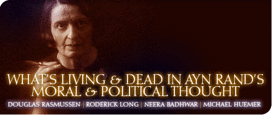Doug is right that the omission of the virtue of practical wisdom from Rand’s discussion is an important one. But I don’t find it surprising: she was not a systematic philosopher, and she omitted to discuss a whole lot of important things, such as generosity, kindness, forgiveness, and charity. Of course, there are philosophical reasons why she didn’t discuss practical wisdom or the virtues of benevolence: she thought the latter “minor” and she assumed, like Plato, that practical and theoretical rationality are one and the same. Hence her view that the truly productive must have all the other virtues. Still, she does show practical wisdom in her heroines’ and heroes’ characters, as she shows generosity, kindness, and forgiveness (or so I argue in “The Virtues of Benevolence: The Unnamed Virtues in The Fountainhead,” ARS, December 1993; see also David Kelley, Unrugged Individualism, 2003).
Michael Huemer is certain that “hardly anyone” other than Objectivists finds “The Objectivist Ethics” “at all convincing.” Well, I could name many, many counterexamples, in addition to the other three people contributing to this symposium. We “counterexamples” find it somewhat convincing because we see more than a Hobbesian, instrumentalist egoism there: we also see a neo-Aristotelian egoism. And I should think that everyone would find it convincing that long-term survival requires a more-or-less moral society, and that predators survive only by free-riding on others. This is not, of course, original with Rand, but it’s rare to see it acknowledged these days by philosophers other than contractarians. (And it’s worth noting, although I know Michael is not disputing it, that no one shows it more vividly than Rand in Atlas Shrugged). That said, I agree that individual rights cannot be defended on the basis of a purely instrumentalist ethical egoism. This is the part of Rand we need to throw out and not link with libertarianism.

